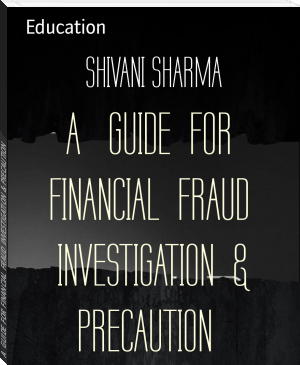A GUIDE FOR FINANCIAL FRAUD INVESTIGATION & PRECAUTION by SHIVANI SHARMA (books to read for beginners .txt) 📕

- Author: SHIVANI SHARMA
Book online «A GUIDE FOR FINANCIAL FRAUD INVESTIGATION & PRECAUTION by SHIVANI SHARMA (books to read for beginners .txt) 📕». Author SHIVANI SHARMA
Harassment via E-Mails: It is very common type of harassment through sending letters, attachments of files & folders i.e. via e-mails. At present harassment is common as usage of social sites i.e. Facebook, Twitter etc. increasing day by day.
Cyber-Stalking: It means expressed or implied a physical threat that creates fear through the use to computer technology such as internet, e-mail, phones, text messages, webcam, websites or videos.
Dissemination of Obscene Material: It includes Indecent exposure/ Pornography (basically child pornography), hosting of web site containing these prohibited materials. These obscene matters may cause harm to the mind of the adolescent and tend to deprave or corrupt their mind.
Defamation: It is an act of imputing any person with intent to lower down the dignity of the person by hacking his mail account and sending some mails with using vulgar language to unknown persons mail account.
Hacking: It means unauthorized control/access over computer system and act of hacking completely destroys the whole data as well as computer programmes. Hackers usually hacks telecommunication and mobile network.
Cracking: It is amongst the gravest cyber crimes known till date. It is a dreadful feeling to know that a stranger has broken into your computer systems without your knowledge and consent and has tampered with precious confidential data and information.
E-Mail Spoofing: A spoofed e-mail may be said to be one, which misrepresents its origin. It shows it’s origin to be different from which actually it originates.
SMS Spoofing: Spoofing is a blocking through spam which means the unwanted uninvited messages. Here a offender steals identity of another in the form of mobile phone number and sending SMS via internet and receiver gets the SMS from the mobile phone number of the victim. It is very serious cyber crime against any individual.
Carding: It means false ATM cards i.e. Debit and Credit cards used by criminals for their monetary benefits through withdrawing money from the victim’s bank account mala-fidely. There is always unauthorized use of ATM cards in this type of cyber crimes.
Cheating & Fraud: It means the person who is doing the act of cyber crime i.e. stealing password and data storage has done it with having guilty mind which leads to fraud and cheating.
Child Pornography: It involves the use of computer networks to create, distribute, or access materials that sexually exploit underage children.
Assault by Threat: refers to threatening a person with fear for their lives or lives of their families through the use of a computer network i.e. E-mail, videos or phones.
Crimes Against Persons Property:As there is rapid growth in the international trade where businesses and consumers are increasingly using computers to create, transmit and to store information in the electronic form instead of traditional paper documents. There are certain offences which affects persons property which are as follows:
Intellectual Property Crimes: Intellectual property consists of a bundle of rights. Any unlawful act by which the owner is deprived completely or partially of his rights is an offence. The common form of IPR violation may be said to be software piracy, infringement of copyright, trademark, patents, designs and service mark violation, theft of computer source code, etc.
Cyber Squatting: It means where two persons claim for the same Domain Name either by claiming that they had registered the name first on by right of using it before the other or using something similar to that previously. For example two similar names i.e. www.yahoo.com and www.yaahoo.com.
Cyber Vandalism: Vandalism means deliberately destroying or damaging property of another. Thus cyber vandalism means destroying or damaging the data when a network service is stopped or disrupted. It may include within its purview any kind of physical harm done to the computer of any person. These acts may take the form of the theft of a computer, some part of a computer or a peripheral attached to the computer.
Hacking Computer System: Hacktivism attacks those included Famous Twitter, blogging platform by unauthorized access/control over the computer. Due to the hacking activity there will be loss of data as well as computer. Also research especially indicates that those attacks were not mainly intended for financial gain too and to diminish the reputation of particular person or company.
Transmitting Virus: Viruses are programs that attach themselves to a computer or a file and then circulate themselves to other files and to other computers on a network. They usually affect the data on a computer, either by altering or deleting it. Worm attacks plays major role in affecting the computerize system of the individuals.
Cyber Trespass: It means to access someone’s computer without the right authorization of the owner and does not disturb, alter, misuse, or damage data or system by using wireless internet connection.
Internet Time Thefts: Basically, Internet time theft comes under hacking. It is the use by an unauthorised person, of the Internet hours paid for by another person. The person who gets access to someone else’s ISP user ID and password, either by hacking or by gaining access to it by illegal means, uses it to access the Internet without the other person’s knowledge. You can identify time theft if your Internet time has to be recharged often, despite infrequent usage.
Cybercrimes Against Government:There are certain offences done by group of persons intending to threaten the international governments by using internet facilities. It includes:
Cyber Terrorism: Cyber terrorism is a major burning issue in the domestic as well as global concern. The common form of these terrorist attacks on the Internet is by distributed denial of service attacks, hate websites and hate e-mails, attacks on sensitive computer networks etc. Cyber terrorism activities endanger the sovereignty and integrity of the nation.
Cyber Warfare: It refers to politically motivated hacking to conduct sabotage and espionage. It is a form of information warfare sometimes seen as analogous to conventional warfare although this analogy is controversial for both its accuracy and its political motivation.
Distribution of pirated software: It means distributing pirated software from one computer to another intending to destroy the data and official records of the government.
Possession of Unauthorized Information: It is very easy to access any information by the terrorists with the aid of internet and to possess that information for political, religious, social, ideological objectives.
Cybercrimes Against Society at large:An unlawful act done with the intention of causing harm to the cyberspace will affect large number of persons. These offences includes:
Child Pornography: It involves the use of computer networks to create, distribute, or access materials that sexually exploit underage children. It also includes activities concerning indecent exposure and obscenity.
Cyber Trafficking: It may be trafficking in drugs, human beings, arms weapons etc. which affects large number of persons. Trafficking in the cyberspace is also a gravest crime.
Online Gambling: Online fraud and cheating is one of the most lucrative businesses that are growing today in the cyber space. There are many cases that have come to light are those pertaining to credit card crimes, contractual crimes, offering jobs, etc.
Financial Crimes: This type of offence is common as there is rapid growth in the users of networking sites and phone networking where culprit will try to attack by sending bogus mails or messages through internet. Ex: Using credit cards by obtaining password illegally.
Forgery: It means to deceive large number of persons by sending threatening mails as online business transactions are becoming the habitual need of today’s life style.
Affects To Whom: Cyber Crimes always affects the companies of any size because almost all the companies gain an online presence and take advantage of the rapid gains in the technology but greater attention to be given to its security risks. In the modern cyber world cyber crimes is the major issue which is affecting individual as well as society at large too.
Need of Cyber Law: information technology has spread throughout the world. The computer is used in each and every sector wherein cyberspace provides equal opportunities to all for economic growth and human development. As the user of cyberspace grows increasingly diverse and the range of online interaction expands, there is expansion in the cyber crimes i.e. breach of online contracts, perpetration of online torts and crimes etc. Due to these consequences there was need to adopt a strict law by the cyber space authority to regulate criminal activities relating to cyber and to provide better administration of justice to the victim of cyber crime. In the modern cyber technology world it is very much necessary to regulate cyber crimes and most importantly cyber law should be made stricter in the case of cyber terrorism and hackers.
Penalty For Damage To Computer System: According to the Section: 43 of ‘Information Technology Act, 2000’ whoever does any act of destroys, deletes, alters and disrupts or causes disruption of any computer with the intention of damaging of the whole data of the computer system without the permission of the owner of the computer, shall be liable to pay fine upto 1crore to the person so affected by way of remedy. According to the Section:43A which is inserted by ‘Information Technology(Amendment) Act, 2008’ where a body corporate is maintaining and protecting the data of the persons as provided by the central government, if there is any negligent act or failure in protecting the data/ information then a body corporate shall be liable to pay compensation to person so affected. And Section 66 deals with ‘hacking with computer system’ and provides for imprisonment up to 3 years or fine, which may extend up to 2 years or both.
CHAPTER - 6 IDENTITY -THIEF
Identity theft is the act of stealing another person’s personal identifying information in order to gain access to his financial resources or obtain access to other benefits, such as money, credit, or insurance benefits. Identity theft sometimes referred to as “identity fraud,” is a crime that carries serious consequences. To explore this concept, consider the following identity theft definition.
Definition of Identity Theft
Noun The act of fraudulently obtaining and using another person’s identifying information or personal financial documents, such as a credit card or bank account, usually for the purpose of financial gain.
Origin 1995-2000 English
What is Identity Theft
With certain identifying information, dishonest individuals can assume the identity of another person, to act in his or her name to obtain financial gain. Information that might enable someone to obtain credit, make purchases, and even empty bank accounts include the victim’s name and address, email address, social security number, date of birth, drivers license number, and other information.
Once a victim’s identity has been assumed, the perpetrator uses the information to access the victim’s financial assets or other resources. Most frequently, the victim does not realize that the crime has occurred, or that his information has been stolen, until he begins to see strange charges on his credit cards, or applies for some type of loan, and is unexpectedly denied. This is why it is important for each person to have an identity theft protection plan.
Identity Theft Laws
Each state has laws that define and punish the crime of identity theft. Additionally, the U.S. Department of Justice aggressively prosecutes identity theft cases under federal laws. Congress enacted the Identity Theft and Assumption Deterrence Act in 1998 in response to the significant and continuing rise in the incidence of identity theft. The Act makes it illegal to possess or knowingly transfer or use another person’s personal identifying information without specific





Comments (0)